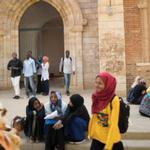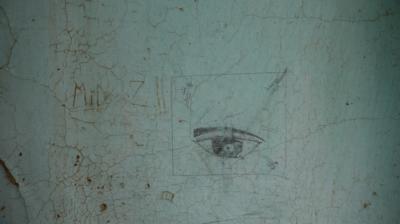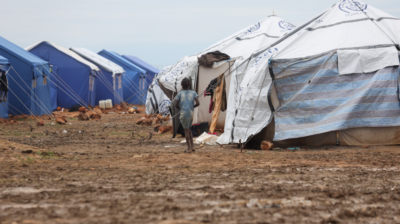War, resilience, and rooting
Thousands of Khartoumians have fled the city. For others, leaving is not an option. They are staying despite the danger, and they are finding ways of coping and living the war. The youth have taken the lead, building a mini state in a situation where the government no longer provides for its citizens.
When the war broke out, many Khartoumians were forced to stay in the city either because they couldn’t afford the journey expenses, because they feared for sick family members who maybe wouldn’t survive the journey, or because they didn’t have any relatives in the countryside or villages. This short note sheds light on the situation of those who have stayed behind - on youth in Khartoum who are making life possible via voluntary work, and on the support given to those fleeing to other places within the country. These are expressions of resilience and solidarity with fellow citizens under extremely demanding and dangerous circumstances.
Resilience of Khartoumians
Those staying in Khartoum under the fire and shooting are crafting life. The youth and other citizens show an image of cooperation and coming together that is beyond guns and war. Immediately after the shooting started in the three cities, Khartoum, Omdurman and Bahri, youth established what is called ‘emergency rooms’ for each city. In these rooms, people in need get services and aid from youth and other volunteers. The rooms communicate via WhatsApp groups and social media platforms. They accept donations of money and kind, distribute information about safe passages, distribute medicine and food for those who can not access it or afford it. They also warn citizens against leaving their houses during fighting and provideinformation about areas where fighting is reported. Many of the youth have been involved in charity associations since 2008 and know exactly which steps to take to combat death. They function as a mini state while the state is collapsing.
Immediately after the shooting started in the three cities, Khartoum, Omdurman and Bahri, youth established what is called ‘emergency rooms’ for each city.
Earlier writings have described how charity groups were redefining everyday politics under the regime of President Al-Bashir, taking charge of everything from controlling the streets to service provision (1). Today they are yet again redefining the role of the state to govern from below and to handle the emergencies of war. Young men and women have returned to the local organization forms of neighborhood committees or resistance committees that they were engaged in during the uprising against al-Bashir from 2018 and after the military coup in 2021. Their experience in managing scarcity and crisis is used to the full in the emergency rooms and in running health services. As one activist expressed, “The hospitals that were not destroyed by SAF air forces, or hijacked by RSF which are still functioning, are run by citizens. They bring gasoline for generators, medicine, and drive medical staff to and from the hospitals. Also, citizens are saving those who are stuck under shooting, giving water to the areas where water is cut off and food for those who cannot find it. Citizens are moving under very dangerous circumstances surrounded by RSF and SAF weapons… citizens are able to run this country.” (2)
Today they are yet again redefining the role of the state to govern from below and to handle the emergencies of war.
Solidarity and rooting outside Khartoum
Similarly, in other states where families from Khartoum have sought refuge, citizens show exceptional support. Many cities, such as Medani, Gedaref, Halfa, Port Sudan, Shandi, Atbara, and Kosti, have hosted Khartoumians running from the war. Village houses have been opened again after many of them were vacant for years, left empty by families who migrated to Khartoum seeking an urban lifestyle. Some of the families returned to villages and cities where they have a grandparents’ house, or an aunt or uncle’s house. Still, there are many others who do not have any property outside Khartoum. They have to rely on support from fellow citizens in the areas they are escaping to.
In the weeks after the outbreak of the war, we have seen people outside Khartoum stretch out a helping hand to those fleeing the capital. Villagers would stop buses and provide passengers fleeing from Khartoum with food, water, tea, juice, and more importantly with a feeling of belonging. By welcoming the displaced and the returnees, the citizens of these states were also saying: ‘you are not alone, and you are safe here’.
The process of Khartoumians going back to the villages is also a process of re-rooting. Some of these families left their villages a long time ago, and never returned before the war. Some of the families had no relations to their villages at all, their children born and raised in Khartoum. Before the war broke out, Khartoum was seen as a safe and flourishing place, in contrast to the image of rural Sudan as unsafe and stagnant. The exodus out of Khartoum has therefore brought a process of belonging and rooting to the country as a whole.
The culture of cooperation and support is nothing new in Sudan. This spirit started to be revived some years ago, with the economic crisis and political instability.
Having described the above contributions by citizens, one must mention that this does not mean all people are involved in goodness. Many merchants have for example raised the prices of goods and some even doubled them. Others have used the time to steal and loot factories in the industrial area. The buses transporting people to Egypt and other states in Sudan raised the tickets prices massively. Many citizens have used the crisis to gain money and make profit out of it. This type of behavior has been exposed on social media and reported as undesirable behavior by many citizens.
In conclusion, the current war in Sudan, despite its impact, has not pushed the Sudanese people into total despair. An unintended consequence of the war is the new ways of belonging that it has revealed. As one activist wrote:’ if they would only know that this war that aims to destruct the social fabric is making new ties for the peace”. The war has demonstrated the resilience of the Sudanese people and a deep desire for a dignified life.
In conclusion, the current war in Sudan, despite its impact, has not pushed the Sudanese people into total despair.
The war in Sudan must stop, and it will stop. After the war, there will be many models of governance from below - models that are set on resilience, hope, decolonization and rooting. The humanitarian efforts that Sudanese people invented are based on a previous experience in civil engagement. The call for a civilian government and civilian governance is needed now more than ever.
This piece is written as an observation from Khartoum, about life after the war erupted. However, information on the causes of the war and about Khartoum as a city can be found elsewhere.
(1) An article in Arabic written by Atta ElBathani : El Bathani, Atta, (2014), “Redefining politics between White Brigade association and emergency street youth”, Al Tageer newspaper. In Arabic: إعادة تعريف السياسة ما بين
جمعية اللواء الأبيض و شباب شارع الحوادث .
(2) A public post by a Sudanese activist on Facebook
This Sudan blog post is published anonymously, but CMI knows the identity and academic credentials of the author. The views expressed in this post are those of the author, and do not necessarily reflect the opinions of the SNAC project or CMI.





